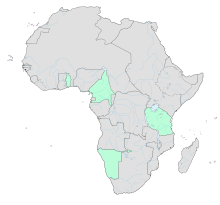German Empire
Africa

The following were German African protectorates:
- Kionga Triangle, 1894–1916
- German South West Africa, 1884–1915
- German West Africa, 1884–1915
- Togoland, 1884–1916
- Kamerun, from 1884–1916
- Kapitaï and Koba, 1884–1885
- Mahinland, March 11, 1885 – October 24, 1885
- German East Africa, 1885–1918
- Witu Protectorate, 1885–1890
- German Somali Coast, 1885–1888
- German Congo, 1884–1885
- German Katanga, 1886
- Gwandu Protectorate, 1895–1897
- Gulmu Protectorate, 1895–1897
- German South Africa, 1884–1885
China
These treaty ports were German concessions in China, leased to it by the Qing dynasty:
- Kiautschou Bay concession, 1898–1914
- German concession in Tientsin, 1895–1917
- German concession in Hankou, 1895–1917
- Chefoo, 1901–1914 [1]
- German Peking Legation, 1900–1917
Pacific

These were German colonies established in the Pacific:
- German New Guinea, 1884–1919
- Kaiser-Wilhelmsland, 1885–1914
- Bismarck Archipelago, 1885–1914
- German Solomon Islands Protectorate, 1885–1914
- Bougainville Island, 1885–1914
- Buka Island, 1885–1914
- Choiseul Island, 1885–1900
- Shortland Islands, 1885–1900
- Santa Isabel Island, 1885–1900
- Nauru, 1906–1914
- Northern Mariana Islands, 1899–1914
- Caroline Islands, 1899–1914
- Palau Islands, 1899–1914
- Marshall Islands, 1906–1914
- German Samoa, 1900–1914
- Protectorate of the Marshall Islands, 1885–1906
- Nauru, 1888–1906
